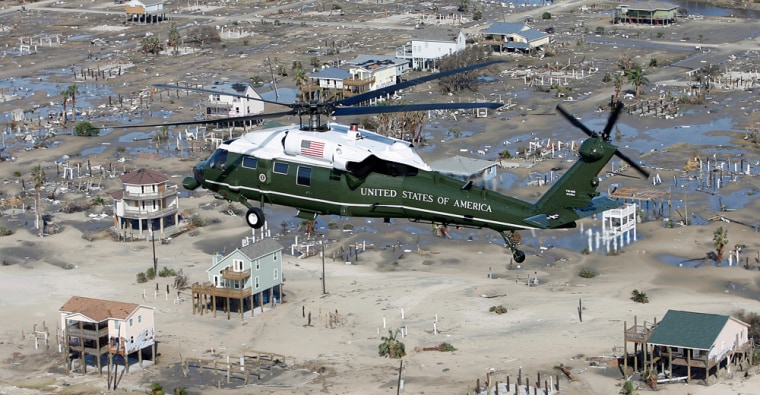President Bush urged Americans on Tuesday to give money to help people recover from Hurricane Ike’s battering of the Gulf Coast, warning against letting “disaster fatigue” slow donations when the need remains great.
The president also asked frustrated people who were displaced by the storm “to listen to state and local authorities before you come back.” Many areas remain without power and are dangerous because of unstable buildings.
“It is their considered judgment which is important for you,” Bush said.
Bush spoke to reporters from Houston, his first stop on a very fast trip through some parts of Texas hardest hit by Ike. He landed at Ellington Field to sunny skies, and was briefed on the storm and its aftermath inside a U.S. Coast Guard hangar.
The president called the destruction a “tough situation.”
“I have been president long enough to have seen tough situations, and have seen the resilience of the people to be able to deal with the tough situations,” he said. “I know with proper help from the federal government and the state government, there will be a better tomorrow.”
He then took an aerial tour of the damage, with his helicopter flying low along the Texas coastline. From the air, he could see homes left with only foundations, roofs torn from buildings, and roads and beaches strewn with debris.
The president’s next stop was Galveston, which suffered far greater damage as the place where Ike made landfall on Saturday as Category 2 storm with 110 mph winds. Areas such as the resort barrier island of Bolivar Peninsula, just east of Galveston, were nearly completely wiped out. The eye missed Houston, but still caused problems such as widespread power outages in the nation’s fourth-largest city. As Ike slogged through Texas and Louisiana and into the nation’s midsection, it has caused over three dozen deaths.
After a quick briefing in Galveston, Bush was leaving Texas, after spending less than three hours in the region.
It was Bush’s third trip to survey Gulf Coast hurricane damage in two weeks. Earlier this month, Bush scrapped his planned opening-night speech at the Republican National Convention in St. Paul, Minn., to fly instead to emergency command centers in Texas just as Hurricane Gustav hit. He returned to the region later that week to visit Louisiana, also socked by Gustav.
As he flew back to Texas Tuesday, the president was monitoring twin crises. He talked by phone with Treasury Secretary Henry Paulson to discuss turmoil in the financial markets. He also received a storm briefing on the plane from FEMA Director David Paulison, Health and Human Services Secretary Mike Leavitt and his homeland security adviser Ken Wainstein, who all traveled with him to the region.
Bush singled out the American Red Cross as needing Americans’ support. The federal government relies on the nonprofit agency and other private organizations to help organize a disaster response, and that takes private donations. The Red Cross in particular is scrambling to replenish its disaster relief funds after repeatedly doling out aid in this busy hurricane season.
“It is very important for our citizens to support the American Red Cross,” the president said. “I hope the country does not have disaster fatigue. The Red Cross is a vital part of helping people recover.”
The main needs for people in the storm zone are food, water and ice. More than 2 million in Texas alone lack power and could wait weeks before the lights come back on. Many thousands also face weeks in shelters, and Bush assured them personally and publicly that the federal government would reimburse them for their costs, up to 30 days, of interim housing.
Paulison said the rescue phase is winding down and officials are turning toward a focus on providing blankets and tarps to victims as well as working on long-term housing solutions. An estimated 70 percent of Houston should have power by the end of the week, but Galveston won’t fare as well, he said.
Bush noted the damage to infrastructure was extensive, but still not as bad as some had predicted.
Ike missed the largest concentrations of oil and gas refineries. But at least 14 Texas refineries closed before the storm made landfall, removing more than 20 percent of the nation’s petroleum refining capacity. Ike also destroyed at least a dozen production platforms and drilling rigs in the Gulf of Mexico — though only a tiny fraction of those there — and production is still shut down in the critical region.
Two major pipelines are up and running again, and power has been restored to a number of massive refineries. But it may be several weeks before the nation’s refining capacity is restored.
Bush’s trip on Tuesday took the place of a fundraising swing he had planned for the day through Topeka, Kan., and Fort Worth, Texas; those duties were being performed instead by first lady Laura Bush.
